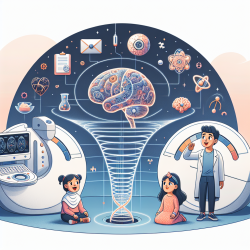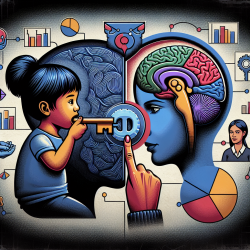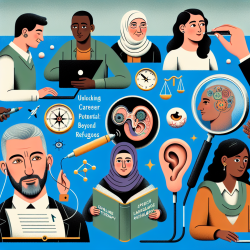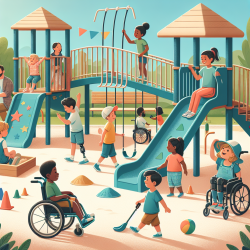Introduction
In the ever-evolving field of speech-language pathology, the intersection of technology and healthcare offers exciting opportunities to enhance diagnostic accuracy and therapeutic outcomes. A recent study titled "Differential diagnosis of neurodegenerative dementias with the explainable MRI based machine learning algorithm MUQUBIA" provides a compelling example of how machine learning (ML) and MRI can be leveraged to improve differential diagnosis in neurodegenerative diseases. While the study primarily focuses on adult populations, its implications for pediatric speech therapy cannot be overlooked.
Understanding MUQUBIA
The MUQUBIA algorithm, developed through the integration of MRI data and machine learning techniques, has demonstrated high accuracy in distinguishing between Alzheimer's dementia, frontotemporal dementia, dementia with Lewy bodies, and cognitively normal controls. The study utilized sociodemographic, clinical, and MRI variables from 506 subjects, achieving an impressive Area Under the Curve (AUC) of 98% in its predictive model. This level of precision underscores the potential of ML in transforming diagnostic processes.
Implications for Pediatric Speech Therapy
While the MUQUBIA study focuses on adult neurodegenerative conditions, the principles and technologies it employs can be adapted to pediatric speech therapy. Here’s how:
- Early Diagnosis: Just as MUQUBIA aids in early and accurate diagnosis of dementias, similar ML algorithms could be developed to identify speech and language disorders in children at an early stage, allowing for timely intervention.
- Customized Therapy Plans: By analyzing MRI data, speech therapists can gain insights into the neurological underpinnings of speech disorders, enabling the creation of personalized therapy plans that address specific neural deficits.
- Tracking Progress: Advanced imaging and ML can provide objective measures of progress, helping therapists adjust interventions based on quantifiable data rather than subjective assessments alone.
Encouraging Further Research
Given the promising results of the MUQUBIA study, it is imperative for researchers and practitioners in pediatric speech therapy to explore similar methodologies. By integrating AI and MRI into clinical practice, the field can move towards more data-driven, personalized care for children with speech and language disorders.
Conclusion
The MUQUBIA study exemplifies the transformative potential of integrating advanced technologies into healthcare. For pediatric speech therapists, embracing these innovations could lead to significant improvements in diagnostic accuracy and therapeutic outcomes. By continuing to explore and implement these technologies, we can unlock new possibilities for enhancing child development and well-being.
To read the original research paper, please follow this link: Differential diagnosis of neurodegenerative dementias with the explainable MRI based machine learning algorithm MUQUBIA.










